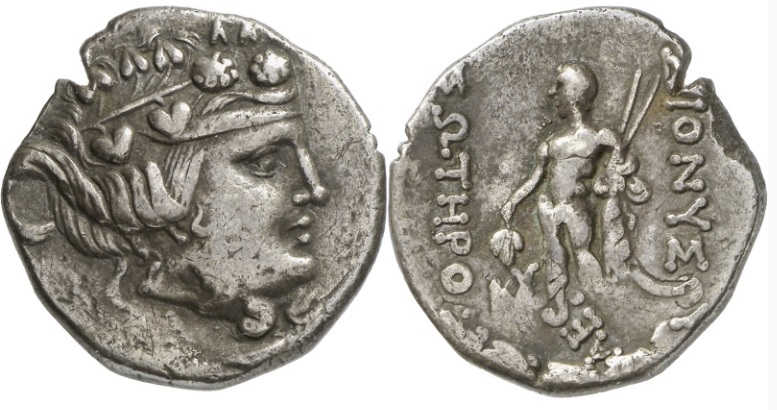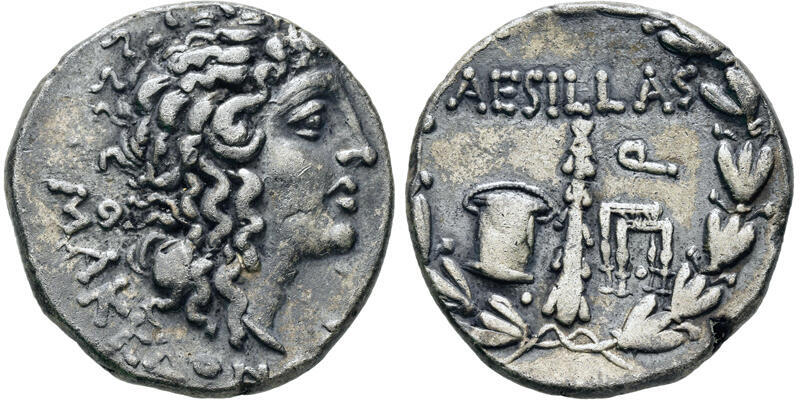1263 - Maroneia (tetradrachm Dionysus/Dionysus O56) over Aesillas (Alexander/club) (Berlin, MK, 18243431): Difference between revisions
From SILVER
No edit summary |
No edit summary |
||
| Line 33: | Line 33: | ||
|Overstruck date to=65 BCE | |Overstruck date to=65 BCE | ||
|Overstruck period=Hellenistic | |Overstruck period=Hellenistic | ||
|Overstruck denomination= | |Overstruck denomination=tetradrachm | ||
|Overstruck standard=Attic | |Overstruck standard=Attic | ||
|Coin series reference overstruck=Callataÿ 1996b; Bauslaugh 2000 | |Coin series reference overstruck=Callataÿ 1996b; Bauslaugh 2000 | ||
Latest revision as of 09:56, 18 February 2024
85 BCE - 70 BCE | ΔIONYΣOY ΣΩTHPΩΣ MAPΩNITΩN
Images
Overstriking coin

Maroneia on Aesillas - Berlin, Münzkabinett, 18243431.jpg [1]
Location/history
| Museum collectionMuseum collection: | Berlin, Münzkabinett, 18243431 | |
Overstriking coin
Description
| ObverseInscription or printing placed on the obverse.: | Wreathed head of young Dionysos right | ReverseInscription or printing placed on the reverse.: | ΔIONYΣOY ΣΩTHPΩΣ MAPΩNITΩN (Greek) Dionysos standing half-left, holding grapes and narthex stalks, monograms to inner left and right |
Mint and issuing power
| MintIdentifies the place of manufacture or issue of a numismatic object.: | Maroneia | Ancient regionAncient region. | Thrace | Modern countryModern country: Greece | AuthorityIdentifies the issuing power. The authority can be "pretended" when the name or the portrait of X is on the coin but he/she was not the issuing power. It can also be "uncertain" when there is no mention of X on the coin but he/she was the issuing power according to the historical sources: | Roman Republic |
Chronology
| FromIdentifies the initial date in a range assigned in a numismatic context. 85 BCE toIdentifies the final date in a range assigned in a numismatic context.. 70 BCE | Hellenistic 323-30 BC |
Physical description
| MetalThe physical material (usually metal) from which an object is made.: Silver |
WeightWeight of the numismatic object (in grams). in grams: 14.8g14,800 mg <br /> | DenominationTerm indicating the value of a numismatic object. Examples: tetradrachm, chalkous, denarius.: tetradrachm |
AxisDescribes the directional relationship between the obverse and reverse of a numismatic object.: 1212 mm <br />1.2 cm <br /> |
| DiameterDescribes diameter of an object (in mm).: 3030 mm <br />3 cm <br /> | StandardStandard.: Attic | ||
References
| Coin referenceReference of the Coin: | Coin series referenceReference to coin series study: | Schönert-Geiss 19841Schönert-Geiss 1984, 92 Nr. 20, Schönert-Geiss 19872Schönert-Geiss 1987, p. 64 and 193 Nr. 1169 Taf. 54 (O56-R176), Bauslaugh 20003Bauslaugh 2000, p. 92, note 14 and p. 9, note 24, HGC 3.24HGC 3.2, n° 1556, Callataÿ 2021a5Callataÿ 2021a, p. 280, n° 12 |
Overstruck type
Description
| ObverseInscription or printing placed on the obverse.: | MAKEΔONΩN (Greek) Head of the deified Alexander the Great right | ReverseInscription or printing placed on the reverse.: | AESILLAS (Latin) Q Money chest, club, and chair, all within laurel wreath |
Mint and issuing power
| MintIdentifies the place of manufacture or issue of a numismatic object. ᵖ: | Thessalonica | Ancient regionAncient region. ᵖ | Macedon | Modern countryModern country: Greece | AuthorityIdentifies the authority in whose name (explicitly or implicitly) a numismatic object was issued. ᵖ: | Aesillas (quaestor in the Roman province of Macedonia in c. 90 BC), Roman Republic |
Chronology
| FromIdentifies the initial date in a range assigned in a numismatic context. 85 BCE toIdentifies the final date in a range assigned in a numismatic context.. 65 BCE | Hellenistic 323-30 BC |
Physical description
| DenominationTerm indicating the value of a numismatic object. Examples: tetradrachm, chalkous, denarius. ᵖ: | tetradrachm |
StandardStandard. ᵖ: | Attic |
References
| Coin type referenceReference to coin series study ᵖ: | Callataÿ 1996b6Callataÿ 1996b, Bauslaugh 20003Bauslaugh 2000 |
Additional data
| Frequency of overstrikesFrequency of overstrikes: | frequent | Level of confidenceLevel of confidence of the identification: | sure |
| RemarksRemarks: | 2nd group of Aesillas with wide and large leaves (see Callataÿ 1996b) | ||
References
- ^ Schönert-Geiss (1984), "Imitationen maroneiischer Münzen", Klio 66 (1), p. [85]-92
- ^ Schönert-Geiss, Edith (1987), Die Münzprägung von Maroneia, Griechische Münzwerk. Schriften zur Geschichte und Kultur der Antike 26, Berlin.
- a b Bauslaugh, Robert A. (2000), Silver coinage with the types of Aesillas the Quaestor, Numismatic Studies 22, New York.
- ^ Hoover, Oliver D. (2017), Handbook of Coins of Macedon and Its Neighbors. 3. Part 2: Thrace, Skythia, and Taurike, Sixth to First Centuries BC, Lancaster-London, xix, 232 p.
- ^ Callataÿ, François de (2021), “On pattern and purpose of overstrikes of late Hellenistic tetradrachms in Thrace Macedonia”, in Ulrike Peter and Bernhard Weisser (eds.), Thrace. Local coinage and regional identity, Berlin Studies of the Ancient World 77, Berlin, Topoi, p. 263-289.
- ^ Callataÿ, François de (1996), "Les monnaies au nom d'Aesillas", in T. Hackens (ed.), Italiam Fato Profugi Hesperinaque Venerunt Litora. Numismatic Studies Dedicated to Vladimir and Elvira Eliza Clain-Stefanelli, Numismatica Lovaniensia 12, Louvain-la-Neuve, p. 113-151.
